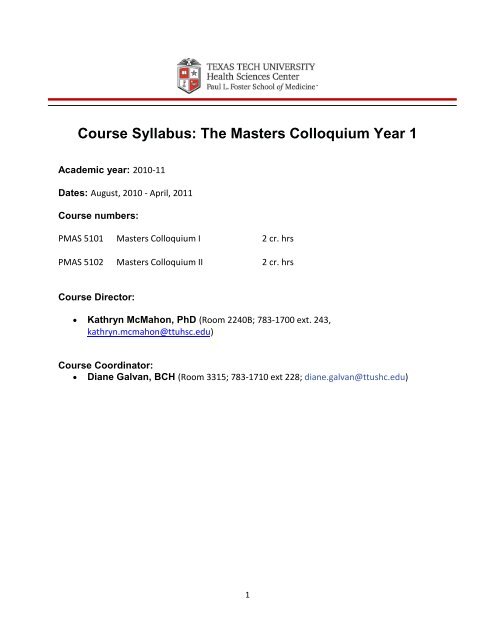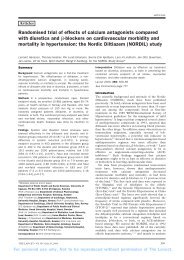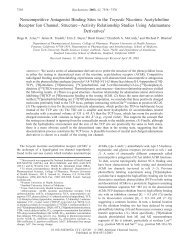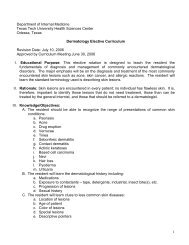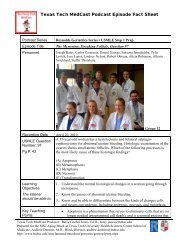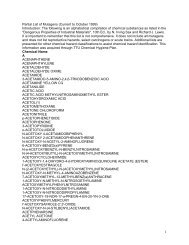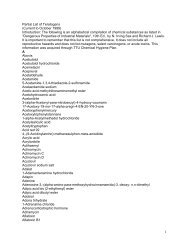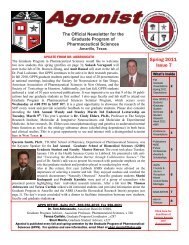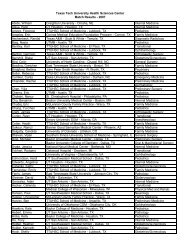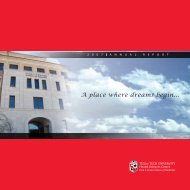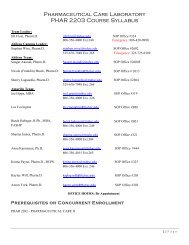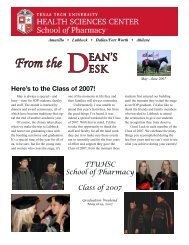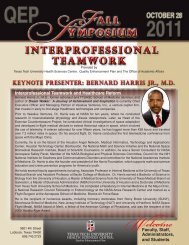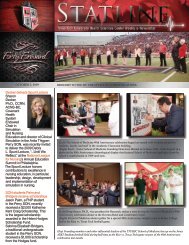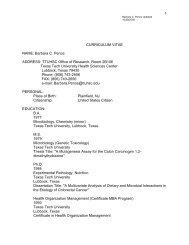Course Syllabus: The Masters Colloquium Year 1
Course Syllabus: The Masters Colloquium Year 1
Course Syllabus: The Masters Colloquium Year 1
You also want an ePaper? Increase the reach of your titles
YUMPU automatically turns print PDFs into web optimized ePapers that Google loves.
<strong>Course</strong> <strong>Syllabus</strong>: <strong>The</strong> <strong>Masters</strong> <strong>Colloquium</strong> <strong>Year</strong> 1<br />
Academic year: 2010-11<br />
Dates: August, 2010 - April, 2011<br />
<strong>Course</strong> numbers:<br />
PMAS 5101 <strong>Masters</strong> <strong>Colloquium</strong> I 2 cr. hrs<br />
PMAS 5102 <strong>Masters</strong> <strong>Colloquium</strong> II 2 cr. hrs<br />
<strong>Course</strong> Director:<br />
• Kathryn McMahon, PhD (Room 2240B; 783-1700 ext. 243,<br />
kathryn.mcmahon@ttuhsc.edu)<br />
<strong>Course</strong> Coordinator:<br />
• Diane Galvan, BCH (Room 3315; 783-1710 ext 228; diane.galvan@ttushc.edu)<br />
1
Table of Contents<br />
<strong>Course</strong> Description……………………………………………………… 2<br />
Overall <strong>Course</strong> Goals & Objectives……………………………… 2<br />
Instructional Methods ………………….……………………………. 4<br />
Contact hours ……………………………………………………………. 4<br />
<strong>Course</strong> Policies and Procedures…………………………….……. 5<br />
Assessment and Grading……………………………………….……. 5<br />
Required Text(s)...…………………………………………………..….. 5<br />
Faculty Roster (College <strong>Masters</strong>).….…………………….….…… 6<br />
Professionalism, Plagiarism and Copyright Policies..….… 6<br />
<strong>Course</strong> Description:<br />
<strong>The</strong> <strong>Masters</strong> <strong>Colloquium</strong> is a weekly two-hour seminar presented every Friday morning to medical<br />
students in <strong>Year</strong> 1. <strong>The</strong> colloquia are conducted in a discussion or workshop format, and cover the<br />
complex, multidisciplinary aspects of professional development.<br />
Domains that will be covered during the colloquia in <strong>Year</strong> 1 include critical thinking and critique,<br />
communication skills, humanism and empathy, and bioethics.<br />
Grading is on a pass-fail basis. Assessment will be based on students’ satisfactory preparation for<br />
sessions, participation in discussions, completion of oral or written coursework assigned periodically<br />
throughout the course, and a sufficient number of correct answers on the summative examination at<br />
the end of each unit.<br />
<strong>Course</strong> Goal and Objectives:<br />
<strong>The</strong> Goal of the <strong>Masters</strong> <strong>Colloquium</strong> is to promote:<br />
• critical thinking and reflective mindfulness in discourse and decision making<br />
• respectfulness<br />
• empathy<br />
• reflective community service<br />
• integrity in relations with others<br />
• engaged, responsible citizenship in the community.<br />
2
Objectives of the <strong>Masters</strong> <strong>Colloquium</strong>: Specific learning objectives and assigned learning<br />
materials will be provided prior to or during the individual learning activities. <strong>Masters</strong><br />
<strong>Colloquium</strong> is designed to meet the following Institutional Learning Goals of the Paul L. Foster<br />
School of Medicine (a complete list of the Institutional Learning Goals can be found in the<br />
Student Handbook).<br />
MEDICAL KNOWLEDGE<br />
• Apply scientific methods for the acquisition of new knowledge, for the critical appraisal of<br />
published knowledge, and to problem solving in the laboratory and patient care<br />
INTERPERSONAL COMMUNICATION SKILLS<br />
• Communicate clearly, respectfully and compassionately with patients, families, colleagues, and<br />
members of the health care team<br />
• Communicate knowledge, interpretation and recommendations orally and/or in writing to a<br />
wide range of professional or lay audiences in culturally appropriate ways<br />
PROFESSIONALSIM<br />
• Describe fundamental ethical principles and how they apply in patient care and medical practice<br />
• Recognize and avoid conflicts of interest that can arise in medical practice<br />
• Display compassion in interactions with all patients regardless of race, gender, ethnicity, sexual<br />
orientation, socioeconomic status and disability<br />
• Apply the highest ethical principles in all professional activities<br />
• Demonstrate respect for the beliefs, opinions and privacy of patients, families, and members of<br />
the health care team<br />
• Demonstrate scrupulous honesty in all professional matters<br />
• Provide compassionate and culturally appropriate care in all stages of the life cycle<br />
• Preserve patient's dignity in all interactions<br />
• Demonstrate advocacy for the interests and needs of the patient<br />
PRACTICE-BASED LEARNING<br />
• Identify the need to employ self-initiated learning strategies (problem definition, resource<br />
identification, critical appraisal) when approaching new challenges, problems, or unfamiliar<br />
situations<br />
3
• Recognize when to take responsibility and when to seek assistance based on one's position,<br />
training and experience<br />
• Demonstrate sophistication in the use of digital resources for patient care, self-education, and<br />
the education of patients and their families<br />
• Demonstrate self-awareness and skills necessary for life-long learning<br />
SYSTEMS-BASED LEARNING<br />
• Describe the components of social structure (e.g., family, neighborhood, community) and the<br />
role each plays in health behavior, disease prevention, and the treatment of illness<br />
Instructional Methods:<br />
• Preparatory reading assignments.<br />
• Writing assignments and creative composition.<br />
• Didactic presentations to introduce or review important concepts relevant to each colloquium,<br />
and to orient students to the activities of the session.<br />
• Facilitated discussion to engage topics, construct conceptual frameworks, gain multiple<br />
perspectives, and explore options.<br />
• Small-group breakout sessions to review previously prepared material, exchange ideas,<br />
complete work assignments, craft potential solutions, and prepare presentations.<br />
• Workshop activities including group problem-solving activities, writing assignments, case<br />
discussions, analysis and critique of creative compositions, literature searches, and journal club<br />
discussions.<br />
Contact hours:<br />
PMAS 5101 <strong>Masters</strong> <strong>Colloquium</strong> I 2 cr. hrs<br />
• Story and Narrative in Medicine - 2 weeks<br />
• Thinking, Cognition and Learning - 5 weeks<br />
• Communication, Culture and Empathy - 10 weeks<br />
PMAS 5102 <strong>Masters</strong>’ <strong>Colloquium</strong> II 2 cr. hrs<br />
• Ethics and Medical Jurisprudence - 13 weeks<br />
4
<strong>Course</strong> Policies and Procedures:<br />
• Attendance at the <strong>Masters</strong> Colloquia is expected. Students will notify their College Master in<br />
advance if they are unable to attend a <strong>Colloquium</strong> session.<br />
• All colleges will follow the same <strong>Colloquium</strong> schedule but activities of the specific <strong>Colloquium</strong><br />
session will vary. Comparable work and preparation will be expected of students from all<br />
colleges but assignments may differ between the colleges. Students from a specific college are<br />
responsible for the activities and preparation defined by the College <strong>Masters</strong> within the specific<br />
college.<br />
• Individual graded writings will be announced with specific instructions, the grading rubric, and<br />
the definition of satisfactory completion of the work to be used provided at least ten days in<br />
advance of the due date.<br />
Assessment and Grading Policies:<br />
<strong>The</strong> <strong>Masters</strong> <strong>Colloquium</strong> will be graded on a pass-fail basis. Grades will be assigned by the College<br />
<strong>Masters</strong>, based upon:<br />
• Satisfactory completion of coursework that is assigned periodically throughout the course,<br />
• Correct response to 75% of multiple choice questions on the unit and year end examinations.<br />
Required Texts:<br />
No required textbook; Individual session readings will be announced and provided at least ten days in<br />
advance of the session.<br />
5
Faculty roster:<br />
Blue College<br />
• Kathryn McMahon (783-1700 ext. 243; kathryn.mcmahon@ttuhsc.edu)<br />
• Gordon Woods (783-1700 ext. 247; gordon.woods@ttuhsc.edu)<br />
Red College<br />
• Quentin Eichbaum (783-1700 ext. 250; quentin.eichbaum@ttuhsc.edu)<br />
• Gary Simpson (78301700 ext. 249); gary.simpson@ttuhsc.edu)<br />
Professionalism, Plagiarism, and Copyright Policies:<br />
In <strong>Masters</strong> <strong>Colloquium</strong>, as with all other courses in the Paul L. Foster School of Medicine we expect<br />
students to adhere to the Student Honor Code as well as the plagiarism and copyright policies as they<br />
appear in the Student Handbook. Students who do not do so are subject to disciplinary action.<br />
6


